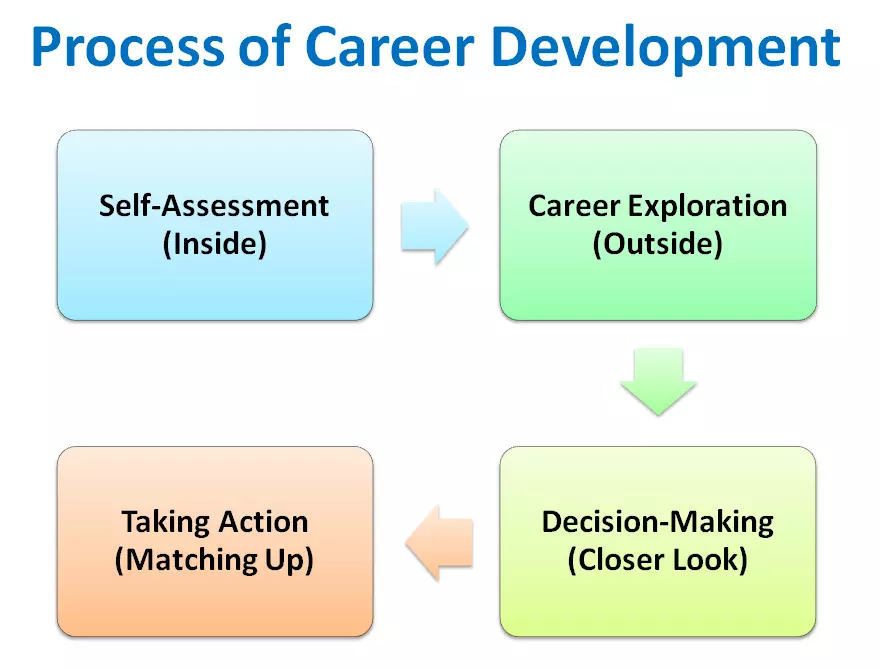Table of Contents:-
- Meaning of Career Development
- Definition of Career Development
- Features of Career Development
- Objectives of Career Development
- Process of Career Development
- Importance of Career Development
- Problems of Career Development
Meaning of Career Development
Career development can be defined as the interaction of psychological, sociological, economic, physical and chance factors that shape the sequence of jobs, occupations, professions or careers that a person may engage in throughout a lifetime. It is one of the essential elements of human resource development.
Career development essentially means the process of increasing an employee’s potential for career change and advancement. It can also be defined as a systematic process of guiding the movement of a company’s human resources through different hierarchical positions in an organisation. Every organization needs to offer career development opportunities to its employees.
Definition of Career Development
According to Pietrofesa and Splete, “Career development is an ongoing process that occurs over the life span; includes home, school, and community experiences”.
As per Gysbers and Moore, “Career development is self-development over the life span through the integration of the roles, settings, and events of a person’s life”.
According to Reardon, Lenz, Sampson, and Peterson Sears, “Career development is a total constellation of economic, sociological, psychological, educational, physical, and chance factors that combine to shape one’s career”.
Features of Career Development
Features of career development are as follows:
1) Career development is an ongoing process.
2) Through career development one can develop and share transferability of skills and competencies.
3) Career development aligns individual goals with organisational goals for increased satisfaction of employees.
4) With the help of career expansion employees can develop skills and competencies required to fulfil present and future leadership roles within an organisation.
5) Career development strengthens professional work culture in the organisations.
Objectives of Career Development
Objectives of Career Development involve encouraging the growth, advancement and fulfilment of individuals’ professional aspirations within an organization.
The major objectives of career development are as follows:
1) To devise intervention strategies for developing, engaging, rewarding and retaining talented personnel.
2) To be able to discuss and apply models of career counselling that are appropriate for use in an organisational set-up.
3) To understand the use of assessment procedures in career development interventions.
4) To understand how to use technology in career development interventions,
5) To plan, design, and implement life-long career development programmes.
6) To locate, identify, evaluate, and disseminate career and educational information to employees, in line with organisational needs and opportunities.
7) To facilitate the acquisition of requisite skills, knowledge and competencies for organisational excellence.
8) To develop and create a pool of talented employees to successfully execute the business strategies of the organisation.
9) To facilitate succession planning and development to ensure the long-term growth and success of the organisation.
10) To evaluate the career development programme and use the results to affect organisational and employee improvements.
Process of Career Development
The career development process involves the completion of a variety of activities geared to help an individual initially determine or confirm the desired life direction. Various steps involved in the career development process are as follows:

Step 1: Self-Assessment (Inside)
The first important step of this process is self-assessment. This step focuses on the inside of a person. After the successful completion, one should have a good idea in terms of who they are and what is most important in their life, ingredients considered by career specialists as crucial for determining accurate direction.
Step 2: Career Exploration (Outside)
This step focuses on the outside of a person. While it is important to know the first step to making a good career, it is also important to become aware of significant influencing areas outside that will need to be factored in before finalising any big decision, Key areas on the outside include the world of work; family, faith/belief, leisure-time and so on. It would be wise to consider and thoroughly examine the supportive as well as non-supporting aspects of each of these key areas before the career and/or occupational choice.
Step 3: Decision-Making (Closer Look)
This step requires focusing on the process of decision making. It will require taking a closer look and ultimately making a decision. This is the point where individual! take what he/she has learned from his/her self-assessment and career exploration and conduct more detailed research. The main goal is to narrow down possible options, consider any significant influencing factors, and select the career which the individual believes to be the best fit.
Step 4: Taking Action (Matching Up)
Taking action involves matching up the results of individual self-assessment results and the most supportive aspects within significant influencing areas. The main goal is to begin to do what one decides to pursue as a career. This might entail enrolling into a college or training programme, registering for a class; conducting a job search; creating a resume, filling out an application, participating in an interview, and so on.
Importance of Career Development
Career development is important in the following ways:
1) Critical Evaluation of Employee Potential
A good career development programme reviews the performance of the employees regularly. Counselling sessions are arranged periodically. Feedback from performance evaluation should be discussed if needed. Based on the discussion, the future career path is mapped out. Often, this is preceded by a critical evaluation of the employee’s possibility. This job evaluation helps of seeing the employee understand if he is suited for the job. If the employee is suited for a better job, it is communicated. He may take steps to move ahead either within this organisation or outside. The employee gets a necessary evaluation of his job fit. Failures on the job are thereby declined.
2) Ensures Needed Talent
Career development is a natural fallout of human resource planning. Human resource planning must identify short and long-term workforce requirements. The requirements of the organisation must meet the expectations of the employees. This ensures their continuation in the organisation. A good career development plan ensures that suitable talent is available when required. This is important in dynamic situations where the organisation’s requirements are very often changing.
3) Retention of Talent
Talented employees are scarce. They are on the move as there is a competition to recruit them. Talented individuals usually prefer employers with robust career development plans for employees. Organisations that offer career advice, often find that their employees are more loyal and committed. Such plans facilitate the retention of talent.
4) Reduces Employee Frustration
The educational level of the workforce has risen. Correspondingly, career aspirations have risen. The past decade has witnessed a spurt in growth, for example, in the Indian information technology sector. There are good opportunities for career advancement prospects. The result is increased satisfaction as personal experiences match organisational opportunities: However, the same cannot be said of the Indian manufacturing sector. Here, employees are frustrated as there is a disparity between personal expectations and organisational opportunities. Good career counselling can facilitate realistic expectations and reduce frustration.
5) Work-Life Balance
Career development reflects employees’ concern for the quality of work life and balance with personal life. The trend of people seeking jobs that offer challenges is on the rise. People are willing to take on more responsibilities and are provided more opportunities for job advancement. Good career planning is essential for this.
Today a large segment of the workforce looks at work-life balance. The work must be compatible with their individual and family interests. Only then they are willing to stay with the organisation. The career development programmes should result in a better match between individual and organisation’s expectations. This reduces attrition.
6) Meet External Requirements
Legislation and affirmative action programmes require that minority groups get opportunities for growth and development. Equal employment opportunity is an important issue for organizations. Job development programmes prepare minority groups for greater responsibilities within the organisation. The job expansion efforts of the organization must be careful not to attract discrimination suits, as such legal actions can tarnish the organization’s image. The reputation of the organisation as a good employer becomes suspected.
7) Improves Competitiveness of the Organisation
Highly educated professionals often prefer organisations that have a good track record of career development. During employee shortages, a recognised programme of career development can be the deciding factor for HRD professionals selecting a position.
8) Avoids Obsolescence
Due to rapid changes, especially in areas such as consumer demands and technology, employees may find that their skills have become outdated. A successful career development programme begins to re-train employees proactively, providing them with the necessary skills to remain current in their field and, therefore, valuable to the organisation. Some of the most basic career development programmes, such as financial planning and general equivalency diploma programmes, can be the most rewarding programmes for the staff.
9) Aligns Personal and Organisational Goals
Career development programmes also assist employees in aligning their own goals with those goals and objectives of the organisation. It sounds difficult but it is not too difficult. Many of us already have informal career development programmes for our company. It might be training, performance appraisal or even succession planning, as a career development programme doesn’t have to be formal.
Problems of Career Development
Problems of career development are as follows:
1) Expensive
Career development programs can become costly when employees from multiple locations have to convene at a central location. However, there is a way to mitigate this cost. Organisations can hold career development meetings using virtual programmes or conference calls.
2) Loss of Productivity
When employees are participating in a career development programme, they are not working. This entails a decrease in production on the days of the program. While this may not be problematic in some sectors, others, such as manufacturing, usually cannot afford the lag in production.
3) May Lead to Employee Turnover
Having employees participate in a career development programme may make them more desirable to competitors. This may lead to the employee leaving the company and using the training provided to help the competitors.
4) Waste of Time and Money
While many career development programmes are a good idea, there are some instances where employees may know all of the information that is presented in the programme. This makes the programme a waste of time and money.
5) Incapable to Solve all Problems
A career development programme would not solve all of the problems that are present in the company. Some issues, such as tardiness and laziness, may only be effectively addressed through staffing changes.
You May Also Like:-
